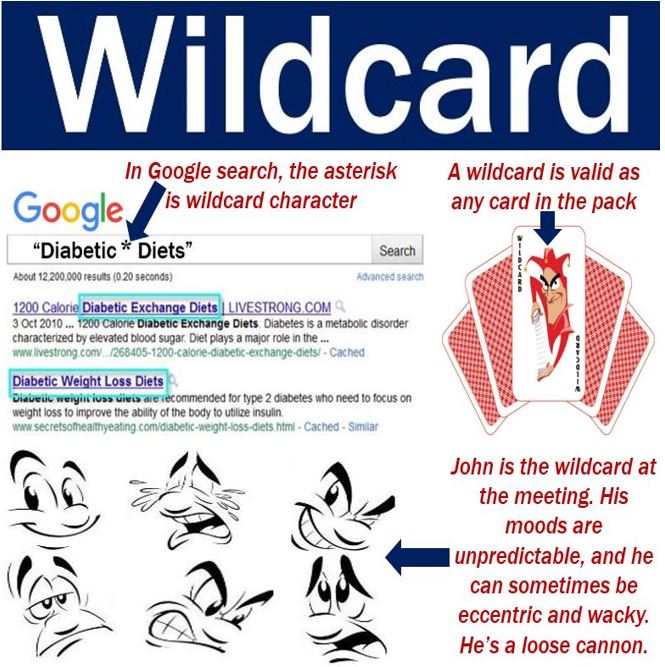A wildcard is a playing card that can match any color, suit, value, or other property in a game – at the discretion of whoever is holding it. The word may refer to an opportunity to enter a sports tournament or competition without having to go through the qualifying rounds or to have reached a specific ranking level.
Sometimes a person or something may be referred to as a wildcard when we do not know how they will behave in a particular situation, as in: “The wildcard in next month’s negotiations is North Korea. How they will behave is anybody’s guess.”
When describing people, the term ‘wildcard’ has a similar meaning to ‘loose cannon’. The person is considered as generally unpredictable, often reckless, whose wacky behavior may either hurt or benefit the event, group, or whatever depending on the situation.
A wildcard may be an unexpected or surprising event. The terrorist attack on the World Trade Center in New York City on 9/11 is an example of a wildcard.
The term can be written as one word – wildcard – or two words with or without a hyphen – wild card or wild-card.

Wildcard in computing
In the world of IT (information technology, i.e. computing), a wildcard may be a symbol used to replace or represent at least one character. For example, a question mark (?) may represent a single character, or an asterisk (*) could represent one, two or more characters.

On its website, Computer Hope offers the following explanations for some wildcards:
– Percent Symbol (%): this is used in SQL to match any character zero or more times; including an underscore.
– Asterisk (*): in a wildcard, matches any character zero or more times. For example, ‘Ref*’ could mean ‘Referee’, ‘Reference’, ‘Referral’, ‘Referendum’ – anything that starts with ‘Ref’.
– Question Mark (?): matches just one character. For example, ‘c?mp’ matches ‘comp’. If you used the question mark twice – ‘c??p’ – you would get ‘coop’.
– Open and Close Brackets ( ) or [ ]: these can be used when referring to and including a range. In many programming languages, for example, [a-z] matches any character in the alphabet, i.e. ‘a’ through ‘z’.
